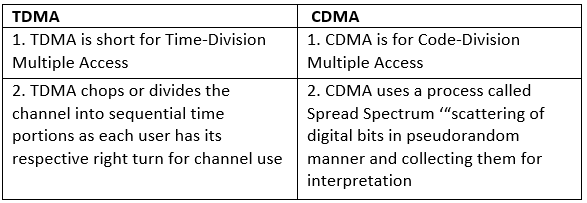Mobile Technologies: Short Answer Type Questions | Computer Application: Class 10 PDF Download
Q.1. What are the proposed applications of 5G? (2 Marks)
Ans: Applications of 5G are beyond our imagination. User never experienced ever before such high value technology which includes all type of advanced features.
Some of the proposed applications of 5G (Fifth Generation) are:
- Charge our mobile using our own heartbeat
- Feel our parent’s sugar level with our mobile
- Know the exact time of our child birth in nano seconds.
- View our residence in our mobile when someone enters and also when someone opens our intelligent car.
- Sense Tsunami/Earthquake before it occurs.
- Access our office desktop, laptop, car, bike using our mobile.
- Identify our stolen mobile within nanoseconds.
- Our mobile can share our workload, identify the best server and also intimate us before the call drops.
Q.2. Explain the features of 2G? (2 Marks)
Ans: The features of Second-generation, 2G:
- Data speed was upto 64 kbps.
- Used digital signals.
- Enabled services such as text messages, picture messages and MMS (Multimedia Message Service).
- Provided better quality and capacity than 1G.
- Unable to handle complex data such as videos.
- Required strong digital signals to help mobile phones work. If there was no network coverage in any specific area, digital signals were weak.
Q.3. Explain the features of 4G. (2 Marks)
Ans: The main features of 4G (Fourth Generation) are:
- Capable of provide 10 Mbps-1 Gbps speed
- High-quality streaming video
- Combination of Wi-Fi and Wi-Max
- High security
- Provides any kind of service at any time as per user requirements anywhere
- Expanded multimedia services
- Low-cost per-bit
- Battery use is more
- Hard to implement
- Needs complicated hardware
- Expensive equipment required to implement next-generation network.
Q.4. Explain the features of 3G. (2 Marks)
Ans: The main features of 3G (Third Generation) are:
- Speed 2 Mbps
- Typically called smartphones
- Increased bandwidth and data transfer rates to accommodate web-based applications, audio and video files.
- Provides faster communication
- Send/receive large email messages
- High-speed web/more security/video conferencing/3D gaming
- Large capacities and broadband capabilities
- TV streaming/mobile TV/Phone calls
Q.5. What is SMS? (2 Marks)
Ans: Short Message Service (SMS) is a text messaging service component of phone, web, or mobile communication systems, using standardi- zed communications protocols that allow the exchange of short text messages between fixed line or mobile phone devices.
Including spaces, text messages traditionally can’t exceed 160 characters.
Q.6. Explain Global System for Mobile GSM communications. (2 Marks)
Ans:
- GSM is a digital mobile telephony system that is widely used in Europe and other parts of the world.
- GSM uses a variation of time division multiple access (TDMA) and is the most widely used of the three digital wireless telephony technologies (TDMA, GSM, and CDMA).
- GSM digitizes and compresses data, then sends it down a channel with two other streams of user data, each in its own time slot.
- It operates at either the 900 MHz or 1800 MHz frequency band.
Q.7. What is the difference between baseband and broadband? (2 Marks)
Ans:
Q.8. What is CDMA? (2 Marks)
Ans:
- Code-Division Multiple Access (CDMA) is a digital cellular technology that uses spreadspectrum techniques.
- Unlike competing systems, such as GSM, that use TDMA, CDMA does not assign a specific frequency to each user.
- Instead, every channel uses the full available spectrum. Individual conversations are encoded with a pseudo-random digital sequence. CDMA consistently provides better capacity for voice and data communications than other commercial mobile technologies, allowing more subscribers to connect at any given time, and it is the common platform on which 3G technologies are built.
Q.9. Write two advantages of 4G over 3G Mobile communication technologies in terms of speed and services. (2 Marks)
Ans: Speed: 4G offers speed of more than 10 Mbps while 3G around 3 Mbps.
Services: It can prioritise services to offer flawless performance.
Example: VoIP is prioritised over other data to offer flawless calling experience.
Q.10. Explain WLL. (2 Marks)
Ans:
- Wireless Local Loop (WLL) is a term for the use of a wireless communications link for deliver- ing Plain Old Telephone Service (POTS) and/ or broadband internet to telecommunications customers.
- This is simply a wireless connection of a telephone in a home or office to a fixed telephone network. Using industry technology, it is an implementation of subscriber loops to connect devices over a multiple access radio system to the Public Switched Telephone Network (PSTN).
- It differs from a standard local loop in that the connection to the telephone system is made wirelessly instead of with cables.
Q.11. Differentiate between TDMA and CDMA. (2 Marks)
Ans:
|
11 videos|49 docs|18 tests
|
FAQs on Mobile Technologies: Short Answer Type Questions - Computer Application: Class 10
| 1. What are mobile technologies? |  |
| 2. How do mobile technologies impact our daily lives? |  |
| 3. What are some examples of mobile technologies? |  |
| 4. How have mobile technologies revolutionized the business sector? |  |
| 5. What are the potential risks associated with mobile technologies? |  |

|
Explore Courses for Class 10 exam
|

|

















